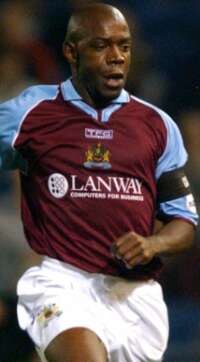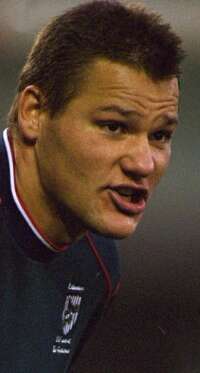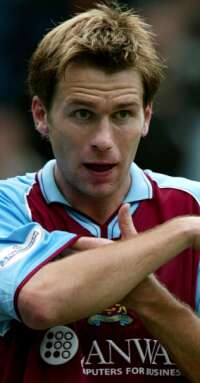|
Losing seventeen players (most of a squad) is cause for concern at the best of times. When they are not replaced, the temptation is to reach for the panic button. All summer long, Burnley’s supporters held their breath, hoping for a veritable plethora of signings. It never happened.
Brian Jensen, a.k.a. "The Beast" arrived from West Bromwich Albion to fill the vacant goalkeeper’s slot. The left-back Mo Camara joined from Wolves having found himself surplus to requirements for the previous season. But the expected flow had evaporated to a meagre trickle.
Hopes of more signings were boosted around this time by Barry Kilby’s comments that up to 10 new players could be arriving at Turf Moor. Again we waited. Again in vain. Pre-season came and went, but the only new additions to the playing squad were former Manchester United right-back Lee Roche and his team mate, Luke Chadwick, the latter swapping the Theatre of Dreams for the Theatre of the Absurd for twelve months. A quality signing, no doubt, but where were the rest?
And so Burnley Football Club went into the first game of the season with a squad of nineteen. But of that number Gareth Taylor, Mark McGregor and youngster Joel Pilkington were all injured, whilst Ian Moore was serving the first match of a three-game ban. All of which meant the ramifications of the player shortage hit home immediately with Ternent only able to fill four of the five places on the bench. How on earth could we compete with such limited numbers? And this was only day one.
On an opening day as hot as any in memory, Burnley were simultaneously everything that we thought they would be – sometimes capable of quick, incisive attack, and on other occasions guilty of the kind of defending perhaps most kindly described as naïve. So it was perhaps no surprise that the interval saw a 2-2 scoreline. One of the debutants, Lee Roche had been hero and villain in a 45 minute period which saw him give away a penalty, converted by Freedman, before making amends by lashing home a shot every bit as scorching as the day itself.
|
In the second half, Burnley were simply dreadful. Having allowed Freedman to complete his hat-trick and give Palace the lead, they then failed to register a single shot on target – even after the Eagles were reduced to nine men following Derry’s second yellow card midway through the second half.
Although it had been three months since the end of the previous season, it was as if nothing had changed. Poor defending, sloppy keeping and the goals against column already showing a minus total.
One of the highlights of last season had been the cup runs. And given our parlous financial state, it was essential that we made the best possible effort to repeat the success of last term. The draw for the latest incarnation of the League Cup (the Carling Cup) had pitted us away to Chesterfield on a balmy mid-summer’s evening. Again, we began with only four subs.
After surviving early pressure from Chesterfield, the Clarets grew stronger as the game progressed. In the second half, Blake, Grant and Little all passed up presentable opportunities to put us into the next round. And after extra time failed to separate the sides, Brian Jensen emerged as the hero with his penalty saves which earned us another tricky away tie at Scunthorpe.
The day after our successful cup exploits, David May, the ex-Rover, arrived on a one season deal at the Turf. Some were disgusted at the thought of an ex-Ewood Park player donning the claret and blue. But most were just happy that a centre-half had been signed ahead of our trip to a side who many had tipped for an automatic return to the top flight.
Judging by the swathes of empty seats at The Hawthorns, not many Burnley supporters seemed to fancy a tea-time trip to WBA. Given the fact that Albion were charging £20 for a seat which cost £14 just 2 years earlier, who could blame them. Not only that, but the game was also live on Sky.
Many had predicted that Burnley would emerge on the wrong end of a good hiding against a team tipped by many to bounce straight back to the Premiership. But the Clarets dominated the opening exchanges and fully deserved the 1-0 lead given to them by Robbie Blake mid-way through the first half.
|
Our luck didn’t change in the second half as shortly before Rob Hulse headed the Baggies in front, the referee had missed a two-handed assault on Little in West Brom’s penalty area. Insult was added to injury late on when Lee Hughes bagged a brace. Burnley were playing some decent stuff, but to be bottom of the pile with seven goals against after two games was not doing an awful lot for confidence.
As if things weren’t bad enough, a rumour was doing the rounds before Burnley kicked off against Wigan that Gareth Taylor was off to Nottingham Forest, with Villa’s Peter Crouch poised to sign on at the Turf until the end of the season.
Maybe the distressing news had filtered through to Burnley’s back four. Certainly something other than marking appeared to be occupying the defence when Peter Kennedy found himself with generous amounts of time and space on the right hand side of the Clarets box as he gave the Pie-Eaters the lead.
Having disappointed for the first half, Burnley got it together after the break, producing some of the fluent attacking football seen at the Hawthorns. Through a mixture of good fortune and good defending, Wigan frustrated Burnley, although Paul Weller should have done better when presented with a point-blank opportunity. Instead he fired straight at John Filan.
Wigan had no such trouble in front of goal, when calamitous defending allowed Nathan "The Duke" Ellington to double the visitors’ lead from a rare second half corner. "The Duke is on fire", sung Wigan’s fans. Burnley’s response was a Richard Chaplow header which cannoned against the underside of the bar and out to safety.
Three games played, three defeats and nine goals against. With a record like that, one of the last places Stan Ternent would have wanted to go was the Priestfield Stadium. Prior to their Bank Holiday visit, Burnley had won there just the once – and that was twenty years ago. But football is nothing if not occasionally a little perverse, and the Clarets managed to come away with a thoroughly deserved 3-0 victory. Robbie Blake continued his good run of scoring, whilst Ian Moore capped his return to the side with a powerhouse display as well as netting the Burnley opener. Sandwiched in between those strikes was a real goal-poacher’s effort from Dean West.
|
The decision to sell last season’s leading scorer had Burnley supporters attempting to reconcile two different sets of emotions. On the one hand, few wanted to see the back of Taylor. It wasn’t just his goals. It was his whole attitude. His lion-hearted bravery (which ironically enough had earned him the injury which had sidelined him) and his never-say-die attitude (remember his hat-trick in the 4-7 defeat at home to Watford?) had endeared him to the overwhelming majority of the Turf Moor faithful.
On the other hand, Burnley Football Club were in no position to turn down a bid of £500,000. Maybe if someone had come in for players who were rumoured to be on higher wages than Taylor, then the sale could have been avoided. But the Welsh international was the only player on Burnley’s books who had attracted any kind of interest. In a subsequent interview the manager hinted that had Burnley not sold Taylor then the worst case scenario would have seen the club in administration or even liquidation. When put like that, the board were clearly presented with Hobson’s choice.
The first post-Taylor game saw Burnley entertain Crewe Alexandra. In an open and entertaining match, the Clarets won out 1-0. Local lad Richard Chaplow netted the winner shortly after the break, and had not Clayton Ince kept out Robbie Blake’s spot-kick, the Clarets would not have had to endure a nervy final fifteen minutes, during which Crewe might have won the match.
The win meant that Burnley ended August in fifteenth place in the embryonic table. Were Burnley to be in the same position come mid-May, then season 2003/04 could be described as an unqualified success.




